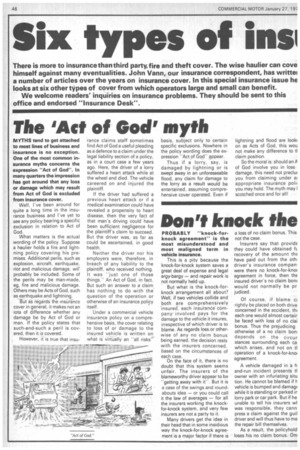The 'Act of God' myth
Page 48

If you've noticed an error in this article please click here to report it so we can fix it.
MYTHS tend to get attached to most lines of business and insurance is no exception. One of the most common insurance myths concerns the expression "Act of God". In many quarters the impression has got around that any loss or damage which may result from Act of God is excluded from insurance cover.
Well, I've been around for quite a long time in the insurance business and I've yet to see any policy bearing a specific exclusion in relation to Act of God.
What matters is the actual wording of the policy. Suppose a haulier holds a fire and lightning policy covering his premises. Additional perils, such as explosion, aircraft, earthquake, riot and malicious damage, wil' probably be included. Some of the perils may be man-made, eg, fire and malicious damage. Others may be Acts of God, such as earthquake and lightning.
But as regards the insurance cover in general, it makes not an iota of difference whether any damage be by Act of God or man. If the policy states that such-and-such a peril is covered, then it is covered.
, However, it is true that insu rance claims staff sometimes find Act of God a useful pleading as a defence to a claim under the legal liability section of a policy, as in a court case a few years ago. Here, the driver of a lorry suffered a heart attack while at the wheel and died. The vehicle careered on and injured the plaintiff.
If the driver had suffered a previous heart attack or if a medical examination could have revealed a propensity to heart disease, then the very fact of that man's driving could have been sufficient negligence for the plaintiff's claim to succeed. But the driver was, as far as could be ascertained, in good health.
Neither the driver nor his employers were, therefore, in breach of any liability to the plaintiff, who received nothing. It was -just one of those things."' An Act of God, in fact. But such an answer to a claim has nothing to do with the question of the operation or otherwise of an insurance policy itself.
Under a commercial vehicle insurance policy on a comprehensive basis, the cover relating to loss of or damage to the insured vehicle is written on what is virtually an "all risks"
basis, subject only to certain specific exclusions. Nowhere in the policy wording does the expression "Act of God" appear.
Thus if a lorry, say, is damaged by lightning or is swept away in an unforeseeable flood, any claim for damage to the lorry as a result would be entertained, assuming comprehensive cover operated. Even if lightning and flood are look( on as Acts of God, this wou not make any difference to ti claim position.
So the moral is: should an A of God involve you in loss damage, this need not preclu( you from claiming under ai appropriate insurance polil you may hold. The myth may I scotched once and for all!




















































































































